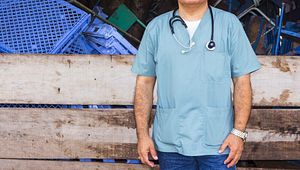As previously reported by the Diplomat, the Médecins Sans Frontières (MSF, or Doctors Without Borders) hospital in Kunduz was recently bombed by U.S. forces. The airstrikes killed 12 staff members, more than 10 patients, and seriously wounded over 50 people. The reason given for the bombing was the presence of Taliban fighters inside the hospital. Whether or not this is true has yet to be confirmed. But the fact remains that the NGO has suffered its most severe loss in Afghanistan. MSF, which operates with the motto “first in, last out,” has become another victim of the conflict and faces the daunting of rebuilding in war-torn Kunduz.
One of the survivors of the attack is Hashmatullah, a 32-year old nurse working at the hospital. Wounded both psychologically and physically, Hashmatullah is in great pain after his right leg was hit by shrapnel during the attack. The Diplomat’s Sanjay Kumar spoke to him to try to understand what actually happened during the attack.
The Diplomat: Can you tell us what happened that day?
Hashmatullah: A week before the attack, been we’d been working very hard amidst the ongoing clashes between security forces and the Taliban. The public hospital had shut down after its workers fled when the Taliban entered the city, so the MSF facility was the only functional hospital in Kunduz City. Therefore, we were under a lot of pressure. We continued tending to our patients despite the clashes taking place all around us. Without water and proper food we remained with our patients for several days.
The night of the attack, I was taking care of a patient in the Intensive Care Unit (ICU,) who had been severely injured by bullets and shrapnel. As I was preparing an injection for him, a huge explosion suddenly hit the hospital around 2:00 a.m. Immediately after that, the hospital was hit by a second explosion. I threw myself on the ground, after which a third explosion rocked the hospital. Later on, we could hear of the ongoing battle between the Afghan National Security Forces and the Taliban nearby. The firing was indiscriminate from both sides. Then I saw a fire engulfing the MSF hospital. I saw one of my colleagues on fire. He was shouting for help but I could not do anything for him, as the fighting was too intense. That helplessness still haunts me.
How many people were inside the MSF compound at the time of the bombing?
There were around 120 staff members working at the hospital at the time of the bombing. There were 90 patients in 60 hospital beds. To cater to the growing influx of patients, the hospital had made arrangement for another sixty beds.
Did you feel that the MSF staff or the hospital itself were under any kind of threat before the airstrike?
No, not at all. But have there been any indication that the hospital would also become a target of the clashes between the Taliban and the security forces, no one would have dared to come out to help the victims in the hospital anyway. We were sure that the MSF would not be bombed as it was only available medical center in the whole region.
Were there any members of the Taliban receiving treatment at the hospital when the attack occurred?
I can say with certainty that there was no Talibs inside the MSF hospital. However, the night before, we received two injured Taliban during the night. We pleaded with them to leave the hospital, which they eventually did. They apparently took their injured to the Chardara district for treatment. A majority of the people who were inside the hospital were medical workers and wounded civilians. Since I was inside the hospital I cannot tell you with certainty whether the Taliban was camping outside the hospital or not.
Why did you join MSF?
Basically, I wanted to serve innocent Afghans. I feel proud working for the MSF and I would have no regrets had I lost my life in serving the people.
Can you describe the scene immediately after the bombing on October 3rd?
The fighting started around 2.30 in the morning and continued till 4 A.M. Bullets were literally raining on the hospital. Everyone inside the hospital was lying on the ground to avoid being shot. We could hear the cries of the people in other rooms. When the fighting subsided, I ran to the next room. It was pure chaos. Many people who had lost their hands or legs were writhing in pain. It was difficult for MSF to provide blood immediately, which caused many to lose their lives.
That day, I lost some of my good friends and the MSF lost some great doctors.
This interview has been edited for clarity.

































